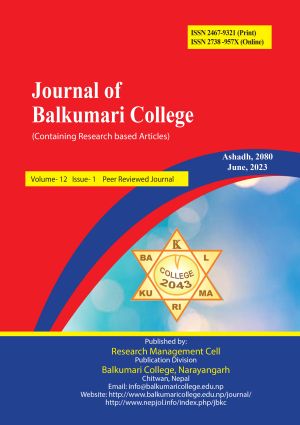Exploring Discrimination Experienced by Secondary Level Students in ELT Classroom: A Narrative Inquiry
DOI:
https://doi.org/10.3126/jbkc.v12i1.60435Keywords:
Discrimination, academic achievement, English Language Teaching, secondary-level students, narrative inquiryAbstract
This study aims at examining the experiences of discrimination in English language classrooms from the perspective of secondary level students. The research adopted a narrative inquiry approach, conducting individual face-to-face interviews with participants to explore their personal experiences and observations regarding discrimination. We selected four secondary level students from two government schools in the Kathmandu district purposively. We used semi-structured interviews allowing for open-ended questions and follow-up probes to gain deeper insights into participants’ responses.The analysis of the collected data followed a thematic approach. The researchers carefully reviewed the transcribed interview recordings to identify recurring patterns, themes, and key insights related to discrimination in English language classrooms.The findings revealed instances of unequal treatment by teachers, including favoritism based on gender, academic performance, and subjective factors. Participants expressed how such unequal treatment affected their motivation and engagement in the English language classroom. Discrimination based on physical appearance, skin colour, and linguistic competence was also highlighted, demonstrating the negative impact on students’ self-esteem and sense of belonging. Additionally, social hierarchies among peers contributed to exclusion and marginalization, affecting students from less privileged backgrounds.To minimize discrimination in ELT classrooms, the study suggests fostering an inclusive and supportive environment where all students are treated equally and valued for their individual strengths and contributions. Teacher training programs are recommended to promote cultural sensitivity, awareness of biases, and inclusive teaching practices. The importance of creating gender-inclusive curricula and encouraging positive gender socialization is emphasized. The research contributes to the understanding of discrimination in English classrooms by centering on students’ perspectives. The insights gained can inform educational policies and practices aimed at reducing discrimination and promoting equity in English language teaching classrooms.




